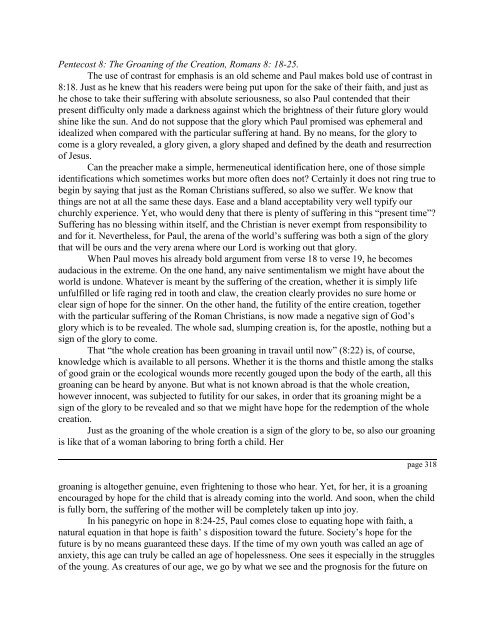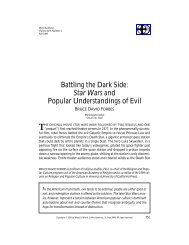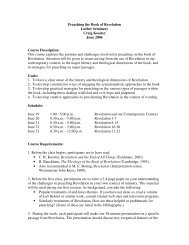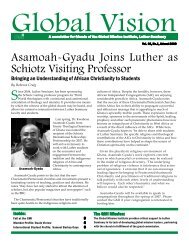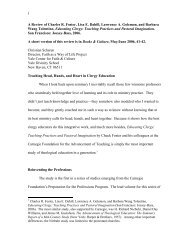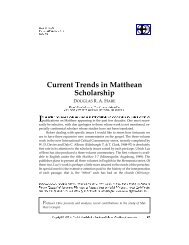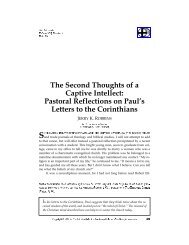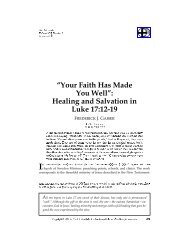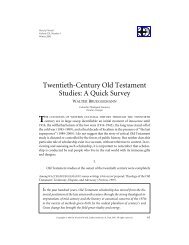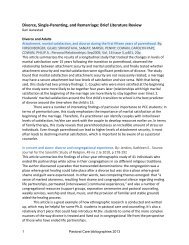Light in August: Romans 8: 18-39* - Word & World - Luther Seminary
Light in August: Romans 8: 18-39* - Word & World - Luther Seminary
Light in August: Romans 8: 18-39* - Word & World - Luther Seminary
Create successful ePaper yourself
Turn your PDF publications into a flip-book with our unique Google optimized e-Paper software.
Pentecost 8: The Groan<strong>in</strong>g of the Creation, <strong>Romans</strong> 8: <strong>18</strong>-25.The use of contrast for emphasis is an old scheme and Paul makes bold use of contrast <strong>in</strong>8:<strong>18</strong>. Just as he knew that his readers were be<strong>in</strong>g put upon for the sake of their faith, and just ashe chose to take their suffer<strong>in</strong>g with absolute seriousness, so also Paul contended that theirpresent difficulty only made a darkness aga<strong>in</strong>st which the brightness of their future glory wouldsh<strong>in</strong>e like the sun. And do not suppose that the glory which Paul promised was ephemeral andidealized when compared with the particular suffer<strong>in</strong>g at hand. By no means, for the glory tocome is a glory revealed, a glory given, a glory shaped and def<strong>in</strong>ed by the death and resurrectionof Jesus.Can the preacher make a simple, hermeneutical identification here, one of those simpleidentifications which sometimes works but more often does not? Certa<strong>in</strong>ly it does not r<strong>in</strong>g true tobeg<strong>in</strong> by say<strong>in</strong>g that just as the Roman Christians suffered, so also we suffer. We know thatth<strong>in</strong>gs are not at all the same these days. Ease and a bland acceptability very well typify ourchurchly experience. Yet, who would deny that there is plenty of suffer<strong>in</strong>g <strong>in</strong> this “present time”?Suffer<strong>in</strong>g has no bless<strong>in</strong>g with<strong>in</strong> itself, and the Christian is never exempt from responsibility toand for it. Nevertheless, for Paul, the arena of the world’s suffer<strong>in</strong>g was both a sign of the glorythat will be ours and the very arena where our Lord is work<strong>in</strong>g out that glory.When Paul moves his already bold argument from verse <strong>18</strong> to verse 19, he becomesaudacious <strong>in</strong> the extreme. On the one hand, any naive sentimentalism we might have about theworld is undone. Whatever is meant by the suffer<strong>in</strong>g of the creation, whether it is simply lifeunfulfilled or life rag<strong>in</strong>g red <strong>in</strong> tooth and claw, the creation clearly provides no sure home orclear sign of hope for the s<strong>in</strong>ner. On the other hand, the futility of the entire creation, togetherwith the particular suffer<strong>in</strong>g of the Roman Christians, is now made a negative sign of God’sglory which is to be revealed. The whole sad, slump<strong>in</strong>g creation is, for the apostle, noth<strong>in</strong>g but asign of the glory to come.That “the whole creation has been groan<strong>in</strong>g <strong>in</strong> travail until now” (8:22) is, of course,knowledge which is available to all persons. Whether it is the thorns and thistle among the stalksof good gra<strong>in</strong> or the ecological wounds more recently gouged upon the body of the earth, all thisgroan<strong>in</strong>g can be heard by anyone. But what is not known abroad is that the whole creation,however <strong>in</strong>nocent, was subjected to futility for our sakes, <strong>in</strong> order that its groan<strong>in</strong>g might be asign of the glory to be revealed and so that we might have hope for the redemption of the wholecreation.Just as the groan<strong>in</strong>g of the whole creation is a sign of the glory to be, so also our groan<strong>in</strong>gis like that of a woman labor<strong>in</strong>g to br<strong>in</strong>g forth a child. Herpage 3<strong>18</strong>groan<strong>in</strong>g is altogether genu<strong>in</strong>e, even frighten<strong>in</strong>g to those who hear. Yet, for her, it is a groan<strong>in</strong>gencouraged by hope for the child that is already com<strong>in</strong>g <strong>in</strong>to the world. And soon, when the childis fully born, the suffer<strong>in</strong>g of the mother will be completely taken up <strong>in</strong>to joy.In his panegyric on hope <strong>in</strong> 8:24-25, Paul comes close to equat<strong>in</strong>g hope with faith, anatural equation <strong>in</strong> that hope is faith’ s disposition toward the future. Society’s hope for thefuture is by no means guaranteed these days. If the time of my own youth was called an age ofanxiety, this age can truly be called an age of hopelessness. One sees it especially <strong>in</strong> the strugglesof the young. As creatures of our age, we go by what we see and the prognosis for the future on


